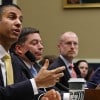Analysis | The Technology 202: Phone records from AT&T and Verizon obtained in impeachment inquiry spark controversy – The Washington Post

President Trump’s personal lawyer Rudolph W. Giuliani has coffee with Ukrainian American businessman Lev Parnas. (Aram Roston/Reuters)
Ctrl + N
Phone logs subpoenaed from Verizon and AT&T put a spotlight on the powerful tools at lawmakers’ disposal as they seek to investigate President Trump in the impeachment inquiry.
The records were some of the strongest circumstantial evidence included in the House Intelligence Committee’s impeachment report this week, revealing extensive contact between Trump’s personal attorney, Rudolph W. Giuliani, and the Trump administration during critical points of the Ukraine saga. They also exposed calls between a Giuliani associate who has been indicted in New York, Lev Parnas, and the ranking Republican on the House Intelligence Committee, Rep. Devin Nunes (Calif.).
Republican lawmakers are blasting Democrats’ decision to publish the records of Nunes’s calls, as well as call records from John Solomon, a conservative columnist formerly at The Hill. Nunes said in a Fox News interview the inclusion of the phone records in the impeachment report is an infraction of his “civil rights” and promised to explore “whatever legal remedies I have.”
“They have now set a precedent where Adam Schiff can go get any phone number he has to AT&T and AT&T is going to comply,” Nunes said.
Sen. Rand Paul (R-Ky.) called Schiff’s move “brazen and shameful” in an op-ed for Fox News yesterday. Rep. Jim Banks (R-Ind.) asked Sen. Lindsey Graham to subpoena Schiff’s records in response, a move the South Carolina Republican shut down. From CNBC’s Christina Wilkie:
But Democrats deny legally asking the telecom companies for any phone records belonging to members of Congress or journalists. The report doesn’t say whose records the committee subpoenaed, but the records suggest they targeted the calls of Giuliani and Parnas.
“The Committee did not subpoena call records for any member of Congress or their staff, including Ranking Member Nunes, or for any journalist, including Mr. Solomon,” Patrick Boland, a spokesman for Schiff, said in a statement. “Any questions about the fact that Members, congressional staff, or journalists appear in call records released by the Committee should be directed at those individuals, who were in contact with individuals of investigative interest to the impeachment inquiry.”
AT&T said that it ensures the requests it complies with are valid.
“Like all companies, we are required by law to provide information to government and law enforcement agencies,” AT&T said in a statement to The Technology 202. “In all cases, we ensure that requests for assistance are valid and that we act in compliance with the law.”
Verizon did not respond to a request for comment.
The entire saga has set off perhaps the most heated debate about phone metadata in Washington since former government contractor Edward Snowden’s 2013 revelations of the intelligence community’s broad collection of such records. The intelligence community and law enforcement’s use of phone records has been heavily scrutinized in the intervening years. But the impeachment inquiry report highlighted that congressional investigators target companies with subpoenas for communications records, too.
“It’s not all that unusual for Congress to obtain and publish communications (texts, emails, phone records, etc.) under their investigatory and subpoena powers,” said Casey Burgat, a resident senior fellow at the think tank R Street Institute, in an email.
It’s rarer for one member of Congress to target another with subpoenas, but not entirely unheard of, experts say. Daniel Schuman, the policy director at the progressive organization Demand Progress, said such a subpoena might be issued during an ethics investigation into lawmakers for alleged behavior like harassment. The committee might start by obtaining records from the individuals involved, but could ultimately turn to phone companies for the full record.
“They will often ask the providers for this information,” he told me.
Republicans are also turning up the pressure on the companies for complying with the subpoenas in the impeachment inquiry. Nunes said on Fox News that AT&T should have fought the request from the Democrats.
“AT&T should have at least went to court to see if what they were going to do was the right thing,” Nunes said.
Jim Baker, a former FBI general counsel who previously worked for Verizon, said the companies “have a rigorous legal process for assessing these requests.”
“They don’t just hand over this stuff willy nilly,” Baker, who now serves as the R Street Institute director of national security and cybersecurity, told me.
Paul, the senator who emerged as a key advocate for privacy during the debate sparked by Snowden, said Schiff’s ability to obtain the records “may not have been illegal” but “it certainly was wrong.” He’s calling on the House to formally censure Schiff for his conduct. In the same op-ed, Paul urged an overhaul of privacy laws to ensure that members of Congress aren’t subpoenaing records from companies about people’s communications without their knowledge.
“Part of the problem lies with Congress writing its own rules for subpoenas and investigations, without any thought of due process,” Paul wrote.
BITS, NIBBLES AND BYTES

The Uber logo. (Robyn Beck/AFP/Getty Images)
BITS: Uber disclosed that it received nearly 6,000 reports of sexual assaults during 2017 and 2018, revealing for the first time the extent of the safety issues on its platform, my colleague Faiz Siddiqui reports. 464 of those reports were rapes.
The company also disclosed in its first safety study about U.S. passengers and drivers in 2017 and 2018:
- 587 reports of attempted rape
- 3,000 reports of groping
- 766 reports of unwanted kissing on the breast, buttocks or mouth
- 1,164 reports of unwanted kissing to a different body part.
- 107 motor-vehicle fatalities
- 19 fatal physical assaults
Uber CEO Dara Khosrowshahi acknowledged in a Twitter thread that the report probably will spark mixed responses:
Uber doesn’t contact law enforcement unless directed by the victim when notified of a sexual assault. Uber was aware of law enforcement involvement in only 37 percent of the sexual assault cases reported to the company, the report says.
“One of the facts about sexual assault is that it is a very under reported offense, and there are a whole lot of reasons why individuals don’t report to law enforcement,” Tony West, Uber’s chief legal officer said, in an interview with NBC. “Uber shouldn’t make that choice for survivors,” he added. “Survivors should make that choice for themselves.”
Uber is releasing this report as social media companies are also being more transparent about the steps they’re taking to address safety on their services, but Uber is the first to do so in the ride-hailing industry. Advocates for sexual assault survivors praised the company for being forthright about the data.
Karen Baker, chief executive officer of the National Sexual Violence Resource Center, praised the ride-hailing service for making the results public, saying she wasn’t aware of any other company voluntarily releasing such unflattering information about itself.
“It’s unprecedented,” Baker said. “And it’s very refreshing. It’s absolutely what needs to happen to bring this out of the shadows.”
“I think that Uber is setting a new high bar for corporate responsibility and transparency,” Baker added. “And I hope a lot of others follow suit.”

TikTok logos. (Dado Ruvic/Reuters)
NIBBLES: TikTok’s chief will tour Capitol Hill next week in an effort to disabuse lawmakers of growing concerns that Chinese-owned company poses serious censorship, privacy and national security risks, my colleagues Tony Romm and Drew Harwell report. The visit will be Shanghai-based executive Alex Zhu’s first known visit to Washington, and lawmakers are already expressing skepticism.
“It’s difficult to see a way forward for TikTok without a complete separation from its Beijing-based owner,” Sen. Tom. Cotton (R-Ark.) said in a statement to The Washington Post.
Zhu has sought a meeting with Cotton, who with Sen. Charles E. Schumer (D-N.Y.) in October urged U.S. intelligence officials to determine whether the app posed a “potential counterintelligence threat.” Zhu hopes to meet with Republican critics, including Sens. Marco Rubio (Fla.) and Josh Hawley (Mo.), who chaired a congressional hearing last month probing the company’s ties to China.
Zhu is also expected to connect with GOP Sen. Marsha Blackburn (Tenn.), who has pressed TikTok to better protect children online, her office confirmed.

The Twitter and Facebook logos. (Dado Ruvic/Reuters)
BYTES: Free-speech advocates are suing the Trump administration over its policy of requiring foreigners to list their social media accounts on their visa applications, my colleagues Tony Romm and Drew Harwell report. The lawsuit, which is being supported by Twitter, claims the requirement amounts to illegal surveillance and violates the Constitution.
The plaintiffs in the case, the Doc Society and the International Documentary Association, argue that social media policies imperiled their work with foreign filmmakers. Some of the U.S.-based groups’ members fear that expressing political views on social media could deter U.S. officials from granting them a visa, while others have refrained from applying for U.S. visas entirely, according to the lawsuit.
The lawsuit questions whether the policy, which the State Department introduced in May, would be useful for government officials and argue social media is an “unreliable reflection of a person’s views.” The rule affects an estimated 14.7 million visa applicants each year. It’s unclear how many visa applications U.S. officials have rejected based on the new process.
Twitter, one of the social media companies whose users are affected by the rule, expressed its support of the lawsuit.
The State Department said it does not comment on pending litigation. DHS did not immediately respond to requests for comment.
PRIVATE CLOUD
— News from the private sector:
Emotional baggage: inside the toxic work environment at Away
Away promised a company culture of travel and inclusion, but former employees say CEO Steph Korey uses the company values to get people to work harder and longer.
The Verge
Inside the hate factory: how Facebook fuels far-right profit
Guardian investigation reveals a covert plot to control some of Facebook’s largest far-right pages and harvest Islamophobic hate for profit
The Guardian
TikTok settles children’s data lawsuit one day after it was filed
It’s COPPA all the way down
The Verge
Google Management Shuffle Points to Retreat From Alphabet Experiment
Sundar Pichai’s appointment as CEO of Google parent Alphabet Inc. effectively shifts the focus back on the company’s advertising profit machine and away from its “moonshots” and other potential new businesses.
Wall Street Journal
Technology
General Motors teams up with LG Chem to jump-start its clean-tech future
The companies say the $2.3 billion electric battery operation will create 1,100 jobs near Lordstown, Ohio.
Faiz Siddiqui
PUBLIC CLOUD
— The Department of Homeland Security dropped plans to mandate border facial recognition scans for U.S. citizens after public backlash, Zack Whittaker at TechCrunch reports. Privacy advocates are applauding the move, but say that Congress still needs to do more to prevent the unchecked use of facial recognition technology by government agencies.
“It’s great to hear that the widespread opposition to the spread of this technology forced the US government to shelve the proposal for now,” Evan Greer, deputy director of Fight for the Future, wrote in a statement. “Congress should pass laws to ban the use of facial recognition for surveillance purposes. Without a ban, our basic human rights are at risk.”
Customs and Border Protection scrapped the proposal after “consultation with Congress and privacy experts,” the agency told Zack. Homeland Security already requires foreign nationals and visitors to have their faces scanned where the systems are installed, but the process is optional for U.S. citizens.
“This proposal should never have been issued, and it is positive that the government is withdrawing it after growing opposition from the public and lawmakers,” Jay Stanley, a senior policy analyst at the American Civil Liberties Union, said in a statement.
— More news from the public sector:
Senators defend bipartisan bill on facial recognition as cities crack down
Sens. Christopher Coons (D-Del.) and Mike Lee (R-Utah) on Thursday defended their proposal to require that law enforcement obtain court orders to use facial recognition software for extended surveillance as a balanced first step amid local pushes to suspend the technology entirely.
The Hill
Ajit Pai Says FCC’s Investigation into Sale of Phone Location Data Nearly Complete
Motherboard previously revealed how AT&T, T-Mobile, Sprint, and Verizon have sold real-time phone location data to middlemen companies which then provided it to third parties.
Vice
EU agrees tough line on digital currencies like Facebook’s Libra
Private digital currencies like Facebook’s Libra should not be allowed in the European Union until the risks they could pose are clearly addressed, EU finance ministers agreed on Thursday.
Reuters
#TRENDING
— Tech news generating buzz around the Web:
She was the sole politician on the list of most-mentioned topics, which also included Billie Eilish and Lizzo.
Business Insider
From AirPower to Zune, a decade of tech and companies that died
Even the last VCR manufacturer lasted until 2016. But the bigger surprise may be what’s still around.
CNET
Internet Culture
YouTube abandoned its cameo-filled approach to “Rewind” and got out of the way instead.
Abby Ohlheiser
@MENTIONS
- TechNet named Silicon Valley Bank CEO Greg Becker as Chairman of TechNet.
CHECK-INS
— Coming up:
- The Senate Judiciary Committee will host a hearing “Encryption and Lawful Acess: Evaluating Benefits and Risks to Public Safety and Privacy” on Tuesday at 10 a.m.

















